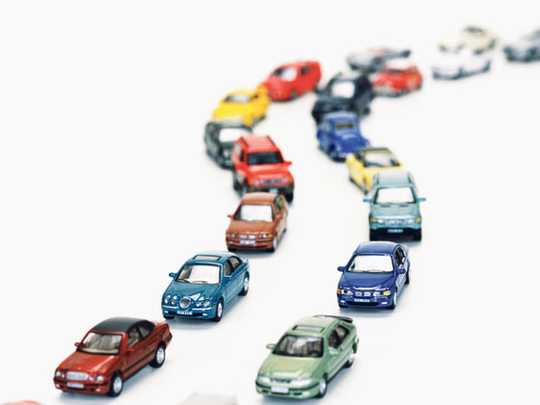
Dubai: No one likes getting stuck in traffic or spending a fortune on petrol, but a lot of UAE residents still make long commutes to work.
Every day, one in ten workers in the country is jamming the roads for more than 90 minutes just to get to work. Experts warn employers about the trend, saying that long-distance commuting can take a heavy toll on employee productivity, personal budget and emotional wellbeing.
According to a study conducted by Regus, a workplace solutions provider, almost half (43 per cent) of UAE residents spend 15 to 30 minutes to shuttle from home to work daily. About 21 per cent take longer trips, between 30 and 45 minutes, while nine per cent commute for 45 to more than one hour each way.
Majority of the residents (79 per cent) are dependent on cars. Around 12 per cent prefer to be chauffeured around in taxis, while a small portion (3 per cent) opt for public buses and less than one per cent choose cycling and motorbike riding.
Hazel Cowling, partner and consultant director of biz-ability, cautioned last week that stressful and long trips to work can significantly affect workers' motivation and energy levels.
"We know that the way your day starts impacts your mood in the rest of the day. Research also had revealed ... a definitive link between people's motivation levels and their productivity. Happy workers make more productive workers," Cowling told Gulf News.
"Equally, if you arrive to work feeling rushed or stressed, then it will take some time for you to be able to focus on your work and get down to business," she added.
Adverse effects
Mark Dixon, CEO of Regus, agreed with the detrimental effects of long commutes on workers' overall job performance. He said spending longer periods on the road can bring about increased blood pressure, musculoskeletal disorders, hostility and adverse effects on cognitive performance of the worker.
"More than a waste of time, long-distance commuting can have serious impact on the productivity of office staff…" Dixon told Gulf News.
Dixon said driving, when carried out for long stretches of time, can negatively affect worker's morale and health. "Driving is not necessarily a very relaxing activity... However, we are not suggesting that waiting for hours for a bus, then squeezing on it to stand until destination is any better," he added.
Commuting times can also have high influence on employee loyalty. "Otherwise-happy and stimulated employees are much more likely to defect if they have a long commute (over one hour). Even journeys of more than half an hour start to significantly affect the likelihood of people considering leaving their present job," he pointed out.
Physical toll
A related study released this month highlighted the negative physiological conditions associated with long-distance commutes. In its survey among American workers, Gallup found that people with lengthy trips to work have lower wellbeing and are more likely to experience back and neck pain, high cholesterol, worry, fatigue and even obesity.
According to the survey, one in three workers who commute for more than 90 minutes said they have had a neck or back condition that caused recurrent pain. "Those with long commutes are also more likely to say they have at some point been diagnosed with high cholesterol and are more likely to have a Body Mass Index that classifies them as obese," the report said.
The report also noted that behavioral economists Daniel Kahneman and Alan Krueger, who tracked in 2004 the emotional states of female workers in Texas, had found that respondents' ratio of positive to negative emotions was particularly low during time spent commuting.
How much time and money do you spend commuting every year? Would you change your commuting habits to cut costs? How do you deal with the strain of lengthy and stressful travel?












